News From the Field
First Quarter 2008
Railson & Heidi Gil
developing Brazilian Community
building the Body of Christ
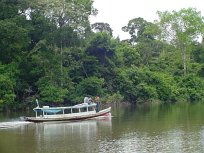
Prayer Agenda:
Our prayer agenda this season centers on the leadership needs of our church, which is in administrational transition from Fonte da Vida to Igreja da Paz.
Letís believe God for the following:
- Unity among church members, spiritually and emotionally. We are praying against barriers to the churchís preparation for the next phase of ministry. We believe the transition to Paz is a very healthy step in the life of this local church, considering its troubled past.
- Perseverance and wisdom , particularly for the young pastor, Perges, in the midst of very difficult decisions, the new leaders from Paz being trained in the city of Monte Alegre, and us in our role as facilitator.
- Direction for our projects , especially the Foundation and Educational Radio which are currently in a holding pattern pending funding.
- Direction for 2nd business, Priminet. Our hope is that the business develops into a strong avenue for funding community projects. The business is registered as an importer and reseller of computers and accessories. We also are working towards an online shop and local computer repair & maintenance workshop.
- New CTL classes beginning in March. While we will not be able to teach in this new session, we support its teaching objectives wholeheartedly.
- Financial Coverage. The dollar has continued to fall which unfortunately has the effect of automatically reducing the value of donations received. Also, since Heidi has not yet been approved for work because of immigration delays, she has had to forego several excellent job offers in nutrition.
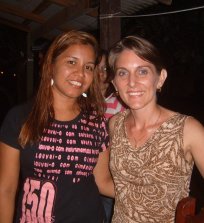
Pastor's wife, Darlene, and Heidi after evening Bible study
The Brazil Scene
Everyday, we participate in the adventure of living and working in a socially needy area. What might that look like? To help you re-familiarize yourself with our corner of the world, take a look at the following statistics. You may find it interesting to note that our region is the largest of five major regions in Brazil, a sizeable country which occupies slightly more than half of the land mass of South America. For this reason, it is difficult to generalize regarding Brazilian statistics, so, unless otherwise specified, the information below is specific to our sub-region, northern Brazil.
| 41% of grade school students are behind in school for their age | |
| 321,700 children donít go to school because they have to help with house/agricultural work | |
| 100,000 girls nationwide are victims of sexual "programs," including sexual tourism | |
| 16% of the population is illiterate | |
| Only 2% of Brazilian Internet use is accounted for by this region due to difficult access. | |
| 36% of mothers have 3 or more children | |
| 9% of newborns present low birth weight | |
| 55% of children 10-15 years old work to help the family income in some significant way | |
| Inflation in late 2007 caused the price of beans and other commodities to as much as triple, exacerbating the regionís nutritional dilemma (among others) | |
| 0.9% of urban areas have organized sewage systems | |
| 24% of the population is between 10 and 19 years of age, while only 3% is over 60 | |
| 36% of the population is considered "poor" even by Brazilian criteria |
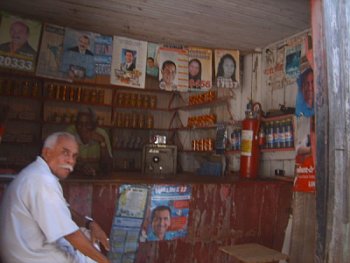
This bar owner was skeptical of having his picture taken, since many innocent-looking photographers actually work for political advantage. Nonetheless, his bar is decorated with politiciansí campaign posters
We believe that the establishment and nurture of the local church is vitally important to the well-being of the community. The church, rather than being just another organization, is a dynamically growing organism composed of spiritually and socially healthy people. As the church is strengthened, believers become aware of their potential to change society. People who know Christ, have a solid basis for self-esteem and as such are motivated to act jointly toward a better future, recognize the importance of the nuclear family, and transmit values. Certainly, the truths that society learns through Christ free it to live well, despite difficult socio-economic circumstances.
As a ministry couple, our desire is to create practical structures to bring large numbers of people to a clearer understanding of Christian living. Our personal vision is summarized in the diagram below.
If you share in this vision, prayerfully consider becoming a sponsor.
New Horizons,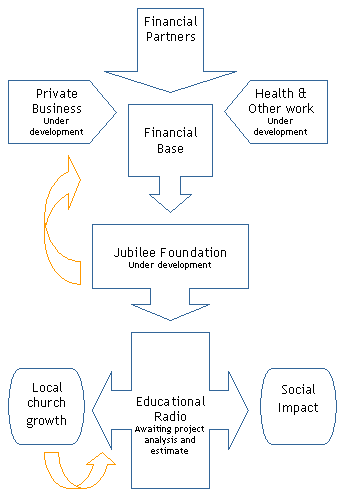
New Partners
One of the greatest pleasures in life is the re-acquaintance with old friends. As we left the Xingu Mission late last year, we were blessed by the support and pastoral coverage of Life Christian Center near Portland, OR. Senior Pastor JD was just out of Bible school when Heidi first knew him 15 years ago. Since then, we have been consistently blessed by his teaching which is strongly based on the Word and geared toward Christianity relevant to the world we live in. In January 2008, LCC took on the commitment to receive our sponsorsí donations in our name.
Let us reiterate that we are no longer working through the Xingu Mission as before. To review a letter from the Mission written on our behalf regarding these changes, click here.
In 2008 we are recruiting new financial partners to our team. If you are not yet a partner, please consider monthly sponsorship at $20, $50, $100 or any other amount you determine. All donations are tax deductible and routed directly to our family and ministry costs.
The steps for giving are basically the same as before. Send a check to Life Christian Center, 5497 SE International Way, Milwaukie, OR 97222 with a note specifying that the donation is for The Gils. Donations are generally received by us within 30 days.
Q & A
One of our US friends recently wrote us with some thoughtful
questions, the answers to which we thought might be interesting to all of
you. Since we thoroughly enjoy responding to letters & emails from our
supporters, we encourage you to write-in and have your questions answered:
gil.77brasil (at) hotmail.com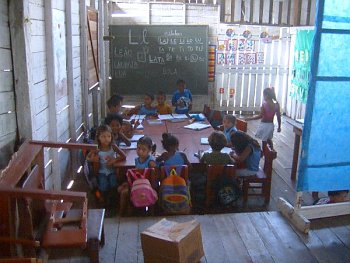
Q: Have you been able to go to Laranjal and visit?
A: All the time. We often do our shopping there since it's much cheaper (different state, the river is the border). It is a very busy-people-cars-bikes-dogs kind of place.
Although their classroom is hot, poorly lit and located over mosquito-infested water, these public grade school kids of the Laranjal are proud to at least be enrolled in school.
Q: Is it safe there?
A: Probably not in the way you define "safe." I wouldn't go about alone after dark. Hang on to your purse and keep it in front of you--that kind of stuff. Just common sense. I always keep a close eye on the kids, too, since child-trafficking has been a problem, at least according to NGOs, and one can never be too safe.
Q: Here's another question I haven't understood. Why do the people live in shacks over the water? Why not build their shack inland where it doesn't flood?
A: Simply put, land costs money. Dry land obviously costs more that wet. If it's an option of living indefinitely with your inlaws or living over a bit of water, what would you do? To be fair, there are plenty of houses over dry land in the Laranjal, but they generally belong to a slightly higher class.
Q: I mean, don't mosquitos breed on the water and why would you want to live on top of them?
A: Now you understand why malaria and dengue [mosquito-transmitted diseases] are endemic. It's another one of the downsides to being poor....